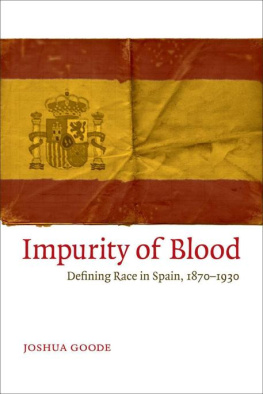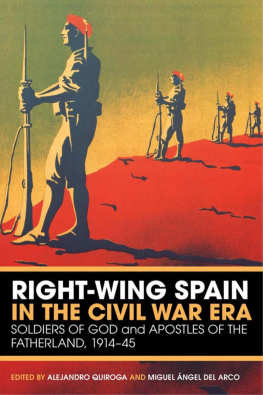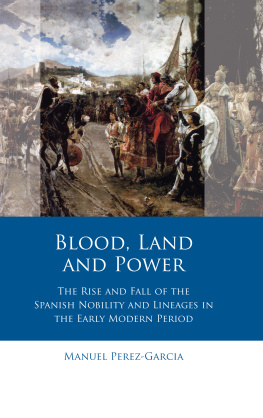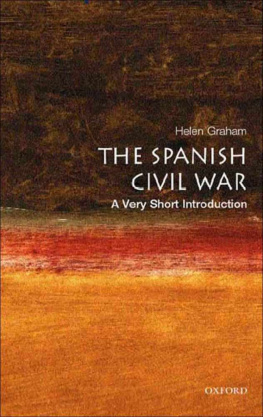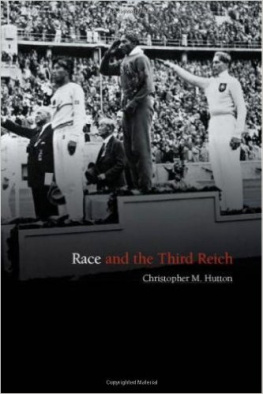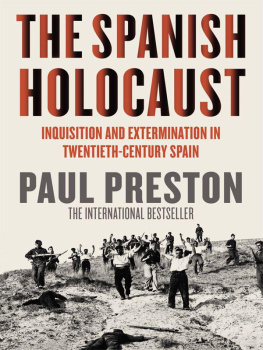Impurity of Blood
Impurity of Blood
Defining Race in Spain, 18701930
JOSHUA GOODE
Published by Louisiana State University Press
Copyright 2009 by Louisiana State University Press
All rights reserved
Manufactured in the United States of America
First printing
Designer: Barbara Neely Bourgoyne
Typeface: Quadraat
Printer and binder: Thomson-Shore, Inc.
Library of Congress Cataloging-in-Publication Data
Goode, Joshua, 1969
Impurity of blood : defining race in Spain, 18701930 / Joshua Goode.
p. cm.
Includes bibliographical references and index.
ISBN 978-0-8071-3516-7 (cloth : alk. paper) 1. EthnologySpainHistory. 2. AnthropologySpainHistory. 3. RaceSocial aspectsSpainHistory. 4. SpainRace relationsHistory. I. Title.
DP52.G684 2009
305.800946dc22
2009021199
The paper in this book meets the guidelines for permanence and durability of the Committee on Production Guidelines for Book Longevity of the Council on Library Resources.

To Karina
Contents
Acknowledgments
This project began, presumably like many others, with a brief conversation between student and graduate advisor. In my case, because my advisor did not work on Spanish history, I worried particularly about speaking in terms broad enough to be interesting. I offered a nervous recitation of the idea, waited through an anxious moment of silence, and finally received for my efforts an interested upturned eye. The nervousness proved to be good training for explaining a topic in Spanish history to an audience most often not particularly interested in Spanish history. My efforts to keep peoples attention from drifting out the window, whether successful or not, have led to the accumulation of many debts and much gratitude owed to a long list of people and institutions that have aided in the completion of this work.
The formulation of this topic and my effort to ground it in a comparative way owes much to the mentoring of Peter Baldwin at the University of California, Los Angeles. It was his upturned eye that gave me a sense of the potential of the topic. He continues to be a cheerful, patient, and reliable mentor and friend. Carolyn Boyd at the University of California, Irvine, has also been a constant source of aid, saving me from any number of blunders of thought and writing throughout many years. Her friendship and guidance, especially as this project transitioned from dissertation to book, never wavered and always proved essential. It has never failed to amaze me that James Amelang, of the Universidad Autnoma de Madrid, working well outside his own time period, has seemed to know more about this project than its author. I cannot measure his immense help or friendship. Others colleagues and friends have provided generous and seemingly unbounded time, patience, and debate, including Courtney Booker, Sandie Holgun, Stephen Jacobsen, Geoff Jensen, Karen Lang, C. Brian Morris, David N. Myers, Pamela Radcliff, Chris Schmidt-Nowara, Douglas Smith, Marla Stone, Eric Storm, Enric Ucelay Da Cal, and Robert Wohl. My colleagues in the History Department at Occidental College always treated me and this project like one of their own. Any positive contribution I make in this work owes much to the input of all of these people. Even though it goes without saying, any errors in the text are mine alone.
Given the understudied nature of the Spanish sciences and the vagaries of the concept of race, my work on this topic benefited from the help of many skilled people in finding appropriate archives or the existence of unpublished sources. Deserving special mention is Patricia Zahnisser at the Commission for Educational Exchange between the United States of America and Spain, which administers the Fulbright in Spain. She helped me contact numerous archives, large and small, a service so important when at first these archives were reluctant to open their doors. Once at the archives, I was aided by many generous archivists, especially Rosana del Andrs of the Ministerio de Interior in Madrid. Dr. Miguel Grimau of the Facultad de Medicina and Dr. Miguel Botella of the Anthropology Department, both of the Universidad de Granada, gave me generous access to and advice on handling Federico Olrizs papers. Dr. Jos Martnez Prez did the same for materials at the Instituto de Historia de la Medicina at the Universidad Complutense in Madrid. Also at the Complutense, Juan Carlos Surez and his staff at the Biblioteca-Hemeroteca of the Facultad de Medicina gave me exceptional access to the library. In the Basque country, Dr. Francisco Etxeberria Gabilondo at the Universidad del Pas Vasco has provided me with constant help and invaluable materials relating to the life of Telsforo de Aranzadi. Manuel Armijo Valenzuela and his excellent staff, Ignacio and Asuncin, at the Real Academia Nacional de Medicina were exceedingly generous with finding resources materials, catalogued and uncatalogued, in their archive. Also deserving special mention are the staffs at a variety of other libraries and archives, namely: the Real Academia de Historia; the Casa-Museo Unamuno at the Universidad de Salamanca; the Hemeroteca Municipal in Madrid; the Archivo General Militar in Segovia; the Servicio Histrico Militar in Madrid; the library of the Museo Nacional de Etnologa in Madrid. Dietrich Briesemeister, the former director, and the staff at the Ibero-Amerikanisches Institut in Berlin also were generous in providing me a home for research and camaraderie while in Germany. On this continent, I am grateful to John de la Fontaine and the staff at Occidental Colleges library, who cheerfully and quickly answered many questions, large and small. I also would like to thank the staff at the College of Physicians in Philadelphia for use of some materials on Spanish doctors unavailable elsewhere.
The following institutions supplied financial support that allowed me to perform archival research in Spain and enjoy unfettered time to produce this work. The Graduate Division and the History Department at UCLA both provided important grants, a Chancellors Dissertation Grant and an ICFOG, respectively, to complete research and writing. The Commission for Educational Exchange between the United States of America and Spain administered the Fulbright Fellowship that allowed me to perform research in Spain. The Del Amo Endowment at UCLA also provided essential assistance for this purpose. Finally, the Program for Cultural Cooperation between Spains Ministry of Culture and U.S. Universities Research Grant allowed me to revisit archives and find new materials in Spain important for the development of this book.
Back in the United States, the criticisms, suggestions, and ideas of participants at conferences where I have presented portions of this work have sharpened arguments and clarified ideas. I especially appreciate the invitation from Jos lvarez Junco to present parts of my work to the Iberian Study Group of the Center for European Studies at Harvard University. Thanks go to David Ringrose and Pamela Radcliffe of the University of California, San Diego, for the opportunity to present works in progress to the Southwestern Spanish History Consortium at UCSD. Also, participants in the UCLA European History Colloquium helped me expand the focus of this work and place it in a wider historical context. Lastly, I want to express my deep appreciation to the many discussants and participants at the annual meetings of the Society of Spanish and Portuguese Historical Studies, where many portions of this work have been presented over the years.

